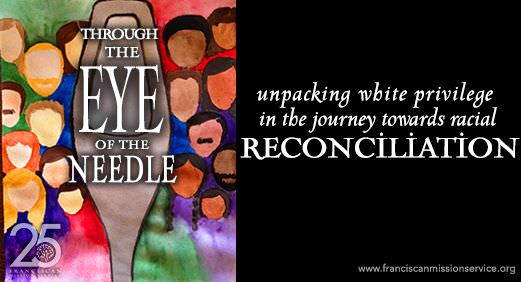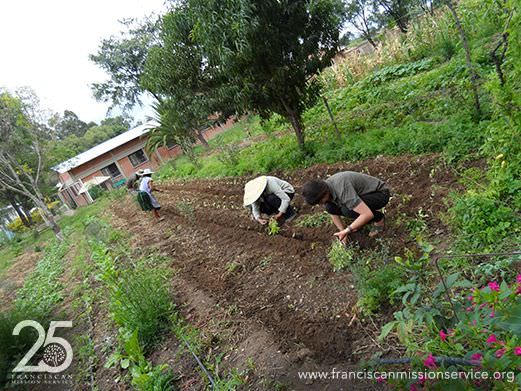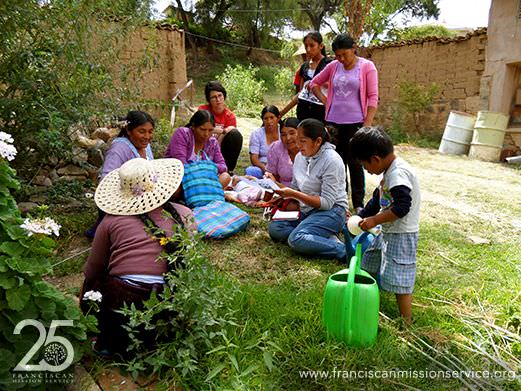Through the Eye of the Needle, Part 2: I Am Not A Saint

Editor’s Note: Lay missioner Annemarie Barrett continues the special five-part series, “Through the Eye of the Needle: Unpacking White Privilege in the Journey Towards Racial Reconciliation” on how her time in mission in Latin America is shaping her understanding of racism and privilege.
One part of my reality as a white person that I took for granted before arriving in Bolivia, was the positive feedback that I received as I prepared to move here.
That positive feedback has continued throughout my time living in Cochabamba. These are some examples of the feedback that I have received from friends and family from the United States:
- “You are such a saint, I don’t think I could ever do what you do.”
- “It is so special that you can teach people there how to share.”
- “That is so great that you can teach them how to garden.”
- “So how is the Bible study you are teaching going?”
- “You are just doing such good work, what a blessing you are to that community.”
While I know my friends and family have good intentions, this type of feedback has made me uncomfortable. And that discomfort has only grown.
That is why I am choosing to share and explain that discomfort now, because it has gotten to big to ignore. It makes me nervous to share this with my supporters and I recognize how challenging it might be for some to hear. I hope being honest about my experiences can open up more dialogue between us and invite us to grow together.
It made me uncomfortable at first because it did not resonate with my experience. I did not see myself moving to Cochabamba as a sacrifice, it was something I chose to do; it was not something I felt obligated to do.
I also did not see myself becoming a Franciscan lay missioner in order to teach people how to be more generous, and certainly not to teach people how to garden or read the Bible.
I did become a Franciscan lay missioner to follow a call that I heard in the Gospel that said that those most marginalized among us have a great deal to teach us about building more just communities together, healing our woundedness, and sharing our joys, and I desired to humbly learn and collaborate in solidarity with those communities.
I did become a Franciscan lay missioner to follow Saint Francis’ lived example of radical accompaniment and solidarity with the marginalized communities in our society. I believe that relationships built in solidarity are at the root of social change and I desired to put that belief into practice.
So why was the positive feedback I was receiving so out of touch with my own experience?
One answer that I found in my own questioning is “white privilege,” or the internalized racial superiority that I experience and that others assume of me, even unconsciously, as a white person.
White privilege is part of the long history of race relations globally that has taught many of us that any white person choosing to engage work with people of color is making a “sacrifice” personally in order to “fix” people of color and their communities.
White privilege is people assuming I am inherently doing “good work” for the benefit of any community of color because I am a white person, without considering the potential negative effects that can stem from good intentions.
White privilege is people casting me as a “saint” for choosing to live in Bolivia.
White privilege is putting me at the center of conversations about our work here. It is assuming that I am in a teaching or leadership role here and that the local community “needs” me to change or progress.
What I have learned is that these assumptions are often built on grave misrepresentations of communities of color that are a part of the reality of racism in our society.
I have come to know the local community where I live and work as incredibly resilient, creative and wise. I learn everyday from the relationships that we have formed. I believe it is a privilege, as a white person, to engage with that wisdom and be invited to collaborate with that resilience and creativity.
However, I have also received a lot of positive feedback from many Bolivians during my time here:
- “You, and other volunteers are such a blessing to us, you arrived here as if God sent you right when we needed you.”
- “You are so funny and your eyes are so pretty.”
- “You will have beautiful babies someday.”
- “You are a blessing to us.”
- “Can you set me up with another white girl just like you?”
I have never heard these compliments given to my co-workers and friends who are Bolivian. And I have learned that I am receiving these compliments because I am white.
I have learned that the living history of colonization and racism here in Bolivia has taught many people, even unconsciously, that I am better than them, more beautiful, funnier, and admirable, just because I am white.
And these compliments are often accompanied by a self-deprecating comment. The comment often goes like this:
“Your skin is so pretty. My skin is so ugly, I wish I had skin like yours, I wish I was white.”
Again, just my presence as a white person evokes shame and the trauma of centuries of oppression. And it is part of larger racist constructs in our society that are telling us all the time that white is good and color is bad. As a white person I am assumed to be good because I am choosing to live and work in a community of color that is assumed to be bad.
I have found that being aware of these dynamics is essential to living a ministry of presence that is rooted in solidarity instead of rooted in privilege and continued oppression.
As a white person, I have found that it is my responsibility to educate myself about these issues and to have the courage to admit when I am wrong in order to change my behavior. This journey is one of faith that requires me to be vulnerable, humble and open to growth.
I invite you all to join me next Thursday as I dig deeper into the realities of structural racism and how it affects our relationships and work across race and culture.
Resources and Further Reading (all cited in post above)
- Definition of “internalized racial superiority”
- “My White Privilege” by Elizabeth Grattan, Medium
- “The White Savior-Industrial Complex” by Teju Cole, The Atlantic
- “#InstagrammingAfrica: The Narcissism of Global Voluntourism” by Lauren Kascak and Sayantai Dasgupta, Pacific Standard
- “Loving White People Won’t Fix Racism” by Stacy Patton, Daily Dose
- “Put Out Internalized Racism: Why Solidarity Between People of Color Matters” by Jarune Uwujaren, Everyday Feminism
Tagged in:



